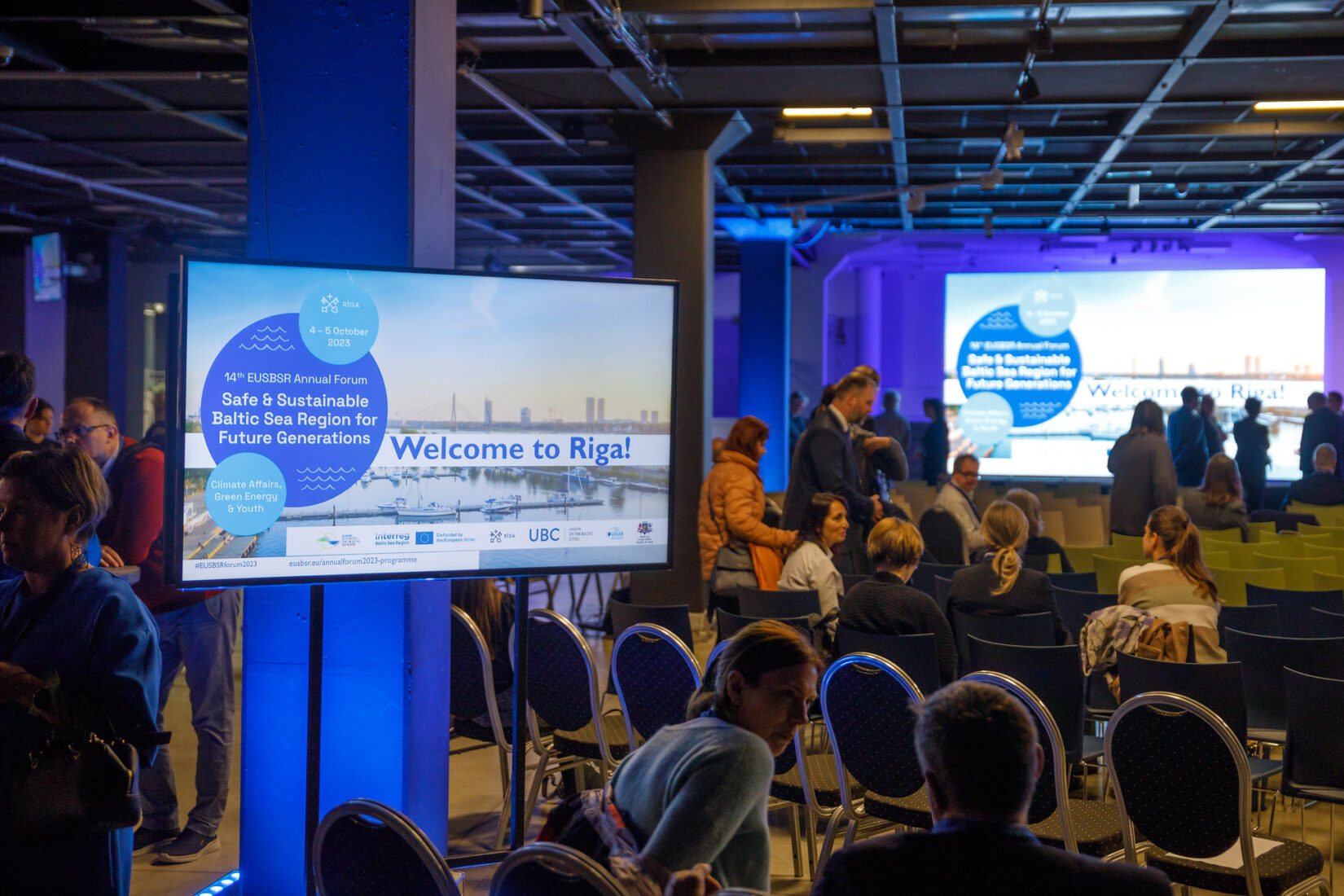Opening statement by the Latvian Minister of Foreign Affairs
The 14th annual forum of the EU Strategy for the Baltic Sea Region was opened by Latvian Minister of Foreign Affairs, Krišjānis Kariņš. He underlined the importance of the objectives set out in the EU Strategy for the Baltic Sea Region.
– Cooperation around the Baltic Sea has a long history. Now it is more important than ever. Today’s challenges – security, climate change, energy independence, and youth involvement – can be successfully addressed only by working together,” Krišjānis Kariņš said.
Activities at the forum
The forum had four main goals: to exchange best practices of cooperation, stronger integration within the Baltic Sea region and beyond, forming synergies between various policy areas, and creating links between the Strategy and the public.
The forum began with expert workshops on topics such as sustainability, marine clean-up, and support for re-building Ukraine. These are challenges which the countries of the Baltic Sea region face together.
Climate affairs and green energy were also widely discussed at the forum. Since the main agents of change and progress are young people, a focus was put on the importance of youth engagement.
The cooperation brings added value
The 14th annual forum offered exciting examples of cooperation between countries, cities and regions. Innovation and networking were key words that characterised the annual forum It was an important event, not only for the Baltic Sea Region, but also for Ukraine and showed that there are many areas in which the countries can cooperate with common benefits.
– Over 14 years, the region’s collaborative efforts have contributed to maritime safety, environmental protection, and economic growth. This cooperation builds trust across borders, said European commissioner for cohesion and reforms Elisa Ferreira in her video address at the opening session .
The Swedish Institute co-arranged workshop on Ukraine
During the forum, the Swedish Institute co-arranged a workshop on how to strengthen and develop cooperation with Ukraine to empower sustainable re-building together with some EUSBSR policy areas related to the Save the Sea objective. Four roundtables were organised by policy areas Nutri, Hazards, Ship and Bioeconomy and at each roundtable at least one Ukrainian expert participated. The workshop also offered reflections from a youth perspective as youths from the Baltic Sea Region Youth Forum participated in the roundtable discussions:
– It will most likely be the 20-year-olds of today who will hold positions of power when a post war relationship is in place. Therefore, young people should have a prominent role, said Simon Jyrkäs, youth representative from the Baltic Sea Region Youth Forum when discussing future cooperation with Ukraine.
Dr. Olga Trofimtseva, Former Acting Minister of Agricultural policy and Food of Ukraine closed the workshop by stressing the need for more dialogue and connection between separate initiatives for and in Ukraine.
– The very active roundtable discussions at the workshop can absolutely lead to real project cooperation, why not with funding from the SI Baltic Sea Neighbourhood Programme, in which Ukraine is one of 13 programme countries. There is a strong interest for working with Ukraine in the Baltic Sea region now, says Camilla Wristel Programme manager at SI.
Background
The EUSBSR was adopted in 2009 and is an agreement between the Member States of the EU and the European Commission to strengthen cooperation between the countries bordering the Baltic Sea in order to meet the common challenges and to benefit from common opportunities facing the region.
No country alone can solve the environmental problems of the Baltic Sea, but together the countries can make progress to stop eutrophication, reduce emissions of hazardous substances and prevent oil spills, among other things.
In addition to maritime issues, the strategy includes many other common challenges and opportunities. Whether it is about transport solutions, joint education initiatives or environmental issues, the starting point is always the same: we solve our common challenges in a better way if we work together. The countries share the responsibility for implementing the strategy. Collaborations are being carried out around the region that aim to achieve the overall objectives of the strategy to save the sea, connect the region and increase prosperity. Read more about the strategy.
The workshop “Strengthening and developing cooperation with Ukraine to empower sustainable rebuilding” aimed to explore the needs for future cooperation between the Baltic Sea region and Ukraine, with a focus on how to enable sustainable rebuilding. Read more about the results of the discussions on the website of the EU Strategy for the Baltic Sea Region.
